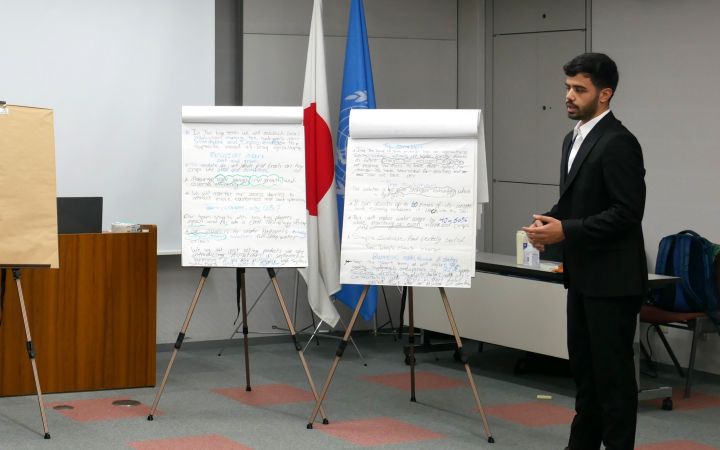Displaying 111 - 120 of 1738
1 September 2025, Hiroshima, Japan - Mohammed Albadri is a fresh graduate of biomedical engineering from southern Iraq. He wants to make changes to the food insecurity problem of his country, which leads to his vision using hydrogels to save water and make the agriculture system more sustainable. The UNITAR “Entrepreneurship and Innovation: Promoting Food Security and Economic Development in Egypt, Iraq, and Lebanon” training programme helped Mohammed to gain skills to help make his vision come true.
28 August 2025, Hiroshima, Japan – The United Nations Institute for Training and Research (UNITAR) conducted the training and study tour “UNITAR SDGs and Digital Futures: Changemaking Through AI/Digital Storytelling” training programme. in Hiroshima from 25 to 28 August 2025, welcoming 13 youth participants from four Asian countries and Hiroshima Prefecture.
28 August 2025, Curitiba, Brazil - The International Training Centre for Authorities and Leaders in Curitiba (CIFAL Curitiba) jointly with the Escola Sesi de Referência Internacional de Londrina and the Colégio Sesi Internacional successfully concluded the virtual learning session 'Diplomacy in Action-Shaping Global Agreements at COP's'.
25 August 2025, Hiroshima – On 25 August 2025, the United Nations Institute for Training and Research (UNITAR) and SPINGLE Co., Ltd. presented “Paper Crane Recycled Sneakers” to the youth participants of the “UNITAR SDGs and Digital Futures: Changemaking Through AI/Digital Storytelling” training programme, collaborating to share messages of peace to the world.
24 August 2025, Hiroshima, Japan – On 24 August 2025, the completion ceremony for the 2025 UNITAR Hiroshima Youth Ambassador Programme was held in Hiroshima City. A total of 25 high school students from Hiroshima Prefecture presented what they learned about nuclear disarmament and peacebuilding. The programme was run by the United Nations Institute for Training and Research (UNITAR) over two months, beginning in June, with the support of the Hiroshima Prefectural Government and Soroptimist International Hiroshima Chuo and in cooperation with the UNITAR Association.
21 August 2025, Hiroshima, Japan - The United Nations Institute for Training and Research (UNITAR) concluded the Prosperity Unleashed: Empowering Young Innovators - Youth Leadership for SDGs Workshop in Tokyo on 9-11 July. This youth development programme features a three-day workshop, gathered 88 aspiring young leaders from universities across China, providing them with a platform to deepen their understanding of the Sustainable Development Goals (SDGs). The individuals learned how to strengthen leadership capacities, explore how young people can contribute to tracking SDG progress, identify challenges, and propose meaningful actions to achieve the SDGs.
20 Aug 2025, Geneva, Switzerland - The United Nations Institute for Training and Research (UNITAR) and the United Nations Development Programme (UNDP) are relaunching the self-paced Massive Open Online Course (MOOC) on SDG-aligned Budgeting. The course is designed to help governments, parliaments, and stakeholders better integrate the Sustainable Development Goals (SDGs) into national budgeting processes.
20 August 2025, Geneva, Switzerland — From 24 to 26 June 2025, UNITAR supported a three-day workshop in Castries, Saint Lucia, as part of the country’s ongoing experimental data project. The initiative aims to explore the integration of data collected via unmanned aerial vehicles (UAVs) with other sources, namely the 2022 Population and Housing Census, satellite imagery, household surveys, and citizen-generated data, to produce official statistics.
15 August 2025, Hiroshima, Japan – Growing up in Asyut, Egypt, Ahmed Hassanein was no stranger to the struggles of smallholder farmers. He witnessed firsthand how low productivity and financial instability pushed many farmers to abandon their land in search of alternative livelihoods. This reality planted the seed of a lifelong mission for Ahmed: to bridge the gap between traditional farming practices and modern sustainable agriculture.
August 2025, Hiroshima, Japan – “The one-week course [of the Program for Global Human Resource Development for Peacebuilding and Development] was intense yet engaging, providing an opportunity to reflect on my career journey thus far…This experience, along with connecting with global cohorts, will undoubtedly be an asset in my long-term career,” says Akiko Hasegawa, Finance Officer in the Budget, Performance Review, and Strategic Planning (BPS) Vice Presidency at the World Bank. She joined the Bank in early 2025 in pursuit of her goal to strengthen results on the ground by enhancing the efficiency of the financial and operations management, which she believes will ultimately contribute to a better world.











